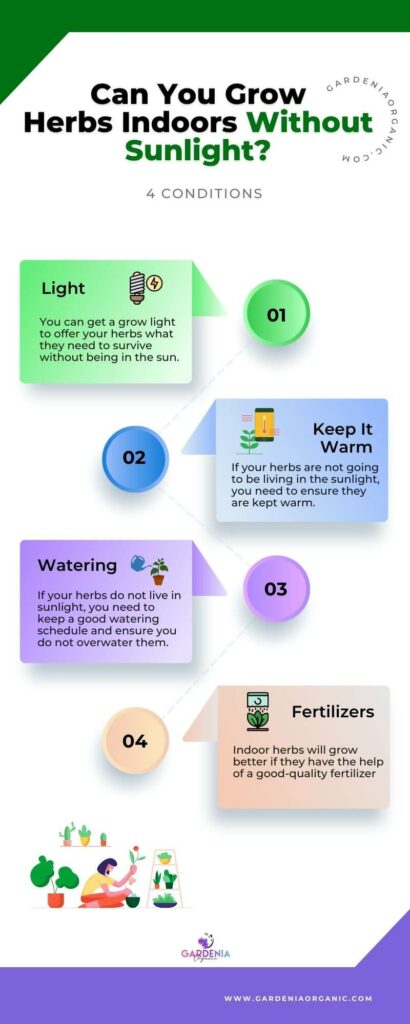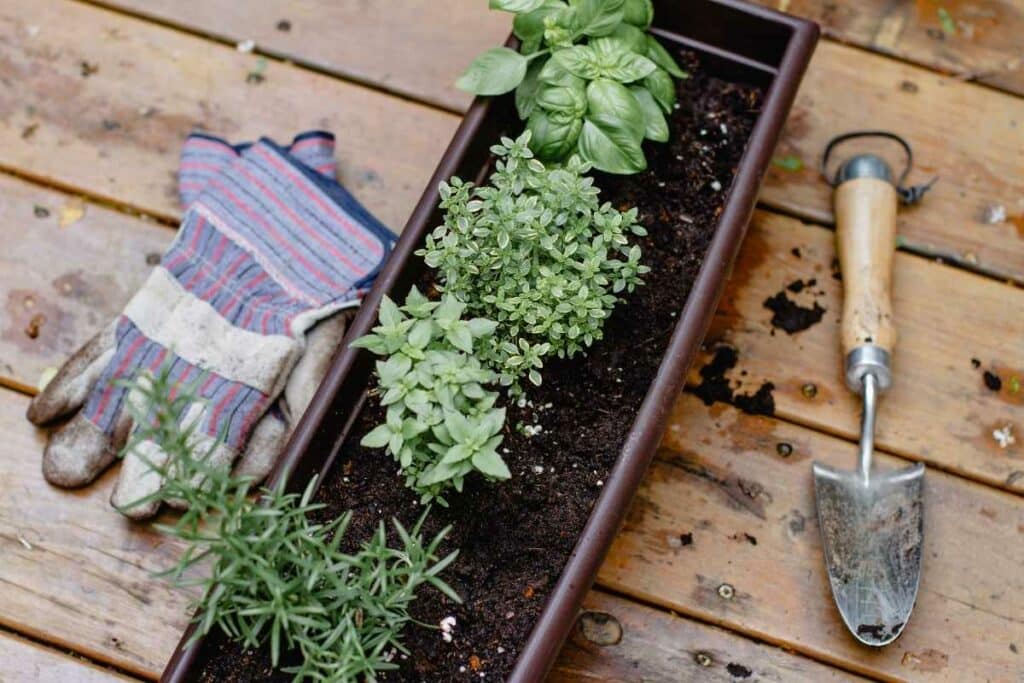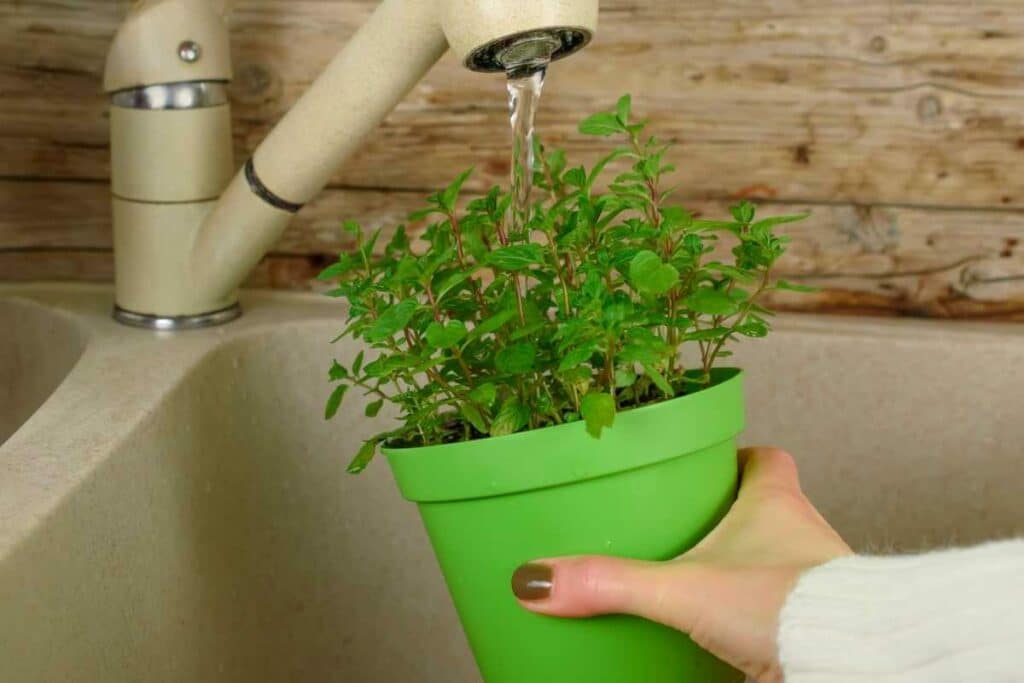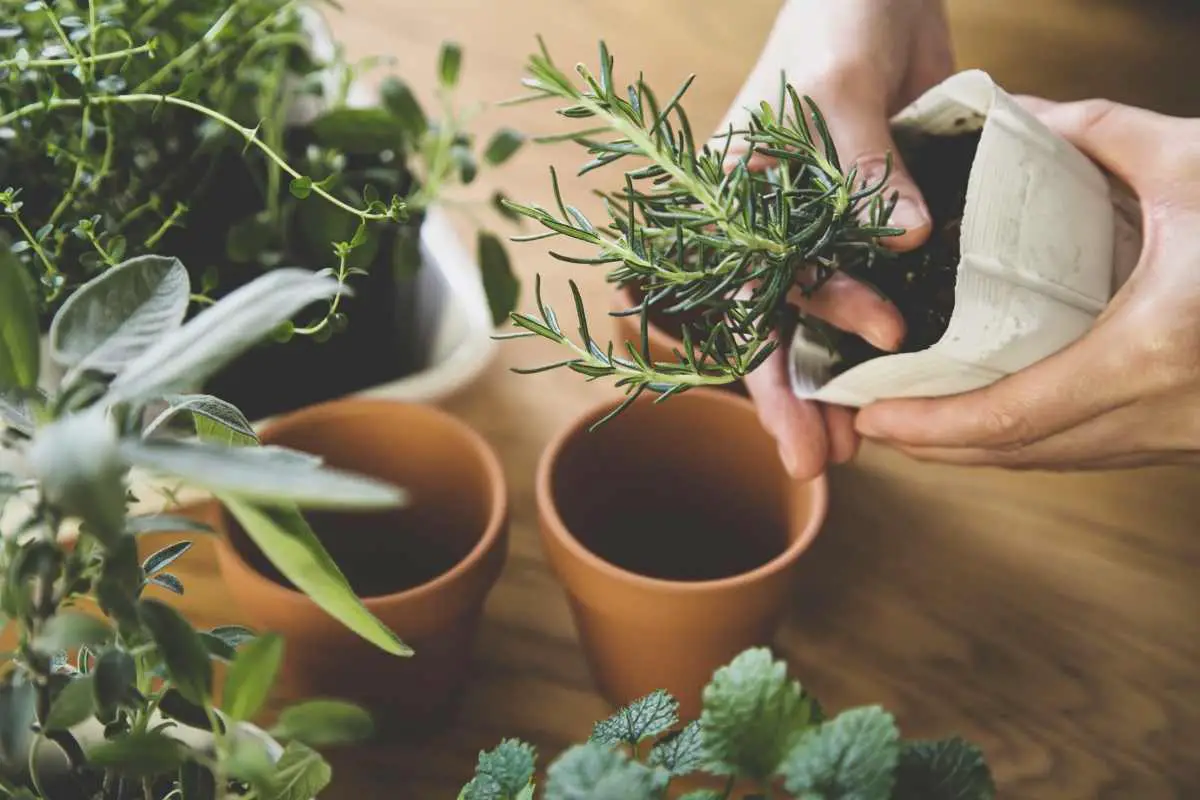Growing herbs can be a fun and tasty task as you will also have fresh herbs to add to all your food and drink recipes, but sometimes it is not always easy to find the space to grow the herbs you want in direct sunlight.
So, can you grow herbs indoors without sunlight?
You can grow herbs indoors without sunlight; remember, all plants need sunlight to survive. You will need to offer some by taking the herbs out for sun every day or buying a grow light from a garden store. If you give them their ideal growing conditions, apart from sunlight, they should be fine.
How can you ensure you grow the healthiest herbs with little to no sunlight available to them?
Which herbs are the best for growing in low light conditions indoors?
We will find out the answers to these questions plus more in this article.
Can Herbs Grow Indoors Without Sunlight?
Yes, some herbs can grow indoors without a lot of sunlight available to them.

You must remember that all plants need some sunlight to carry out their cellular processes and survive well, so you will still need to offer your indoor plants some light.
Alternative: It does not need to be natural light as you can use a grow light.
How to Grow Herbs Indoors Without Sunlight
As you can grow herbs indoors without sunlight, how exactly do you do this and keep your plants happy too?
Below is the requirement you will need to follow to help your herbs grow indoors without sunlight.
Add A Little Light
Even though you are growing herbs indoors, you will need to give them some light, as all plants require light to survive and carry out their life processes.
Herbs will also rely on light to create their flavor, but it does not need natural sunlight either.
You can get a grow light to offer your herbs what they need to survive without being in the sun.
You can get these grow lights at almost all gardening stores today, but if you do not want to buy something, then you can just take your herbs outside for a few hours, or you can grow them on your kitchen windowsill.
Keep the Herbs Warm
If your herbs are not going to be living in the sunlight, you need to ensure they are kept warm.
The temperature range of their growing area needs to stay between 65 degrees and 75 degrees Fahrenheit.
If your herbs get too cold, they will either suffer from loss of leaves, or they may even die before you can even harvest anything from them.
Keep a Watering Schedule
If your herbs do not live in sunlight, you need to keep a good watering schedule and ensure you do not overwater them.
Remember, if your herbs are not getting sunlight, they do not need as much water to survive, and their soil will take longer to dry out.
So, if you overwater your indoor herbs, they will be prone to root rot, which can kill the plant.
For the first few weeks that you have your herbs, you need to monitor them and see how fast the herb’s soil dries out in the conditions you keep them in.
You can then formulate a watering schedule from there.
Use Good-quality Fertilizers
Indoor herbs will grow better if they have the help of a good-quality fertilizer; just ensure you use an organic fertilizer as you will be eating the herbs.
As your herbs are not getting much sunlight, you will need a fertilizer with a good amount of nitrogen.

You can get a fish emulsion fertilizer as this works well for indoor herb growth.
Herbs That Grow Well Indoors Without Sunlight
Now that you are aware of how you can grow herbs indoors without sunlight, we can go through which herbs you can use this growing method for.
Below are some great indoor herbs that can grow with little sunlight.
Thyme
Thyme is one of the easiest herbs options to grow indoors and with little to no sunlight available.
This hardy herb is evergreen and has been grown for human consumption for centuries, and this sweet-smelling herb was also used in bathing rituals since the ancient Greek period.
Now, this herb is used widely worldwide in many different recipes to bring a lovely lite flavor to the dishes.
When you are growing Thyme indoors, the biggest thing to keep in mind is drainage:
- This plant requires soil that offers good drainage and does not retain a lot of water.
- This herb is more drought tolerant than most other herbs, meaning Thyme is very sensitive to overwatering, and it can die due to this.
- This herb only needs to be watered when its soil is dry to the touch.
Rosemary
Rosemary is a Mediterranean herb that gets its name from Latin, which translates into “dew of the sea.”
As this herb is Mediterranean, you need to consider the conditions in its native province to recreate its living conditions to keep this herb happy.
Rosemary does enjoy a lot of light, so if you want to grow this herb indoors without sunlight, you will need to get yourself a growing light for your Rosemary to stay healthy and producing.
Don’t Forget: You need to water this plant a lot as it likes its water, and the soil needs to be well-draining.
Chives
Chives are a culinary landmine for offering flavor to your dishes.
This herb adds a lovely grassy brightness to just about any recipe.
Chives are much like garlic, but they have a sweeter taste, and they look like green onions with a much brighter green color.
These herbs are pretty simple to grow, and they enjoy a moist environment with some light, so you will need a growing light for them, but it will only need to be on for a few hours with chives.
The ideal watering schedule for this herb is at least twice a week, but more if you live in hot climates.
Mint
Suppose you want your indoor herb to grow fast. In that case, mint should be your go-to, as these herbs will quickly take over any pot you place them in.

For this reason, it is highly recommended that you keep mint in its own pot that has a wide surface and that this herb is kept away from other pots as this herb is a runner.
Apart from its terrifying ability to take over everything it touches, this herb is lovely and refreshing. It is added to many foods and drinks recipes to create a tasty summer cocktail.
Plus: There are so many different varieties you can choose from, each with a slightly different taste, offering your room to experiment.
Parsley
Parsley is one of the most well-known and most used herbs in the culinary world as it offers a lite and delicate flavor that can elevate any recipe you add it to.
You can even use Parsley in some dessert dishes; that is how versatile this herb is.
There are so many different varieties of Parsley that you can try out to see which one has your favorite flavor.
This herb is known for being shade tolerant and can handle being grown indoors with very little light.
Conclusion
Growing herbs indoors without sunlight is not difficult if you have the right equipment at your disposal.
Many herbs can grow in these conditions, but you need to watch them carefully to ensure they stay healthy.
If you are going to be consuming the herbs you grow, make sure that you only use organic products while growing them.
Good luck with your indoor herbs!
Read Also
- How to Grow Celeriac from Cuttings?
- How to Grow Alfalfa Microgreens?
- Why Are My Cilantro Stems Turning Purple?
